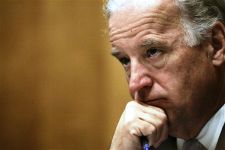US slammed for delaying Sudan sacntions over Darfur
April 11, 2007 (WASHINGTON) — The Bush administration came under intense fire in Congress Wednesday after a senior official revealed the president had again delayed imposing sanctions against Sudan over its handling of the conflict in Darfur.

Andrew Natsios, Bush’s special envoy to Sudan, told a Senate panel the delay was decided because UN Secretary General Ban Ki-moon had requested another two to four weeks to persuade Khartoum to allow UN peacekeepers into Darfur.
“I think we need to give him a chance — that means if he asks for a two- to four-week delay we need to give him that,” Natsios said of Ban’s request.
It was the latest in a string of postponements of unilateral US sanctions — a so-called “Plan B” — that Natsios first said would be imposed in January if Sudan’s government persisted in resisting a UN demand for deployment of 20,000 UN-led peacekeepers to halt a four-year civil war in Darfur.
Several Senators from the opposition Democratic Party sharply criticized the latest delay and demanded tougher action, including the use of military force, to end a conflict between ethnic African rebels and government-backed Arab militia that has left at least 200,000 people dead and 2.5 million homeless.
“I am at a loss as to why we aren’t engaging in everything, including the use of military force, to stop them,” said Joseph Biden, chairman of the Senate Foreign Relations Committee.
“I think it’s not only not time to take force off the table, it’s time to put force on the table and use it now,” he said during a heated exchange with Natsios. “I think there’s a moral imperative to do that.”
“We are being waltzed while people die,” added fellow Democrat Robert Menendez, referring to stalling tactics used for the past eight months by Sudanese President Omar al-Beshir to avoid deployment of the UN peacekeepers.
The Sudanese fear the force will undermine Khartoum’s sovereignty over Darfur and could lead to the arrest of officials accused of warcrimes there.
A string of UN and international leaders has traveled to Khartoum in recent weeks in a bid to convince Beshir to change course.
South African President Thabo Mbeki was in the Sudanese capital Wednesday and the number-two official in the US State Department, John Negroponte, leaves for Sudan and neighboring states on Thursday.
Natsios defended the decision to give negotiators more time and said a lull in fighting in Darfur since January had improved prospects for arranging peace talks between rebel groups and the government.
Natsios also stressed that multilateral action involving the UN or European Union would be more effective than go-it-alone US sanctions.
“We need Ban Ki-moon’s support on this,” he said.
The White House meanwhile said Bush had spoken to Ban on Wednesday about “the need for greater action to resolve the crisis in Darfur,” according to a spokesman.
Natsios said the US sanctions package now on Bush’s desk included financial actions against 29 Sudanese companies and tougher implementation of existing sanctions on 130 other firms, all linked to the government.
They would also slap travel bans and assets freezes on a Darfur rebel leader who has been “obstructing” peace efforts and on “war criminals” among the Sudanese government leaders, he said.
Natsios said the measures would prevent the targeted companies, some of which are involved in Sudan’s oil industry, from doing business in US dollars — a tactic already used to pressure Iran and North Korea over their nuclear programs.
“We believe it will have an effect on the economy, a substantial effect,” Natsios said, adding that discussions were underway with the Europeans on similar measures that would hit Sudanese companies’ euro dealings.
Natsios declined to provide additional details in public or discuss possible military action against Khartoum, but said “all military options are on the table.”
Biden argued in favor of a NATO-enforced no-fly zone over Darfur, a region the size of France, but Natsios said this could harm efforts to provide humanitarian aid to the 2.5 million displaced people in the province.
(AFP)
